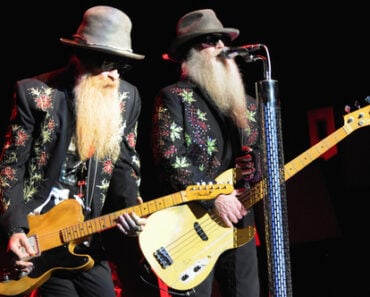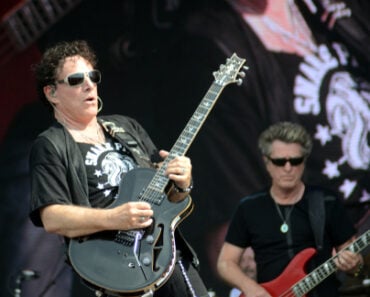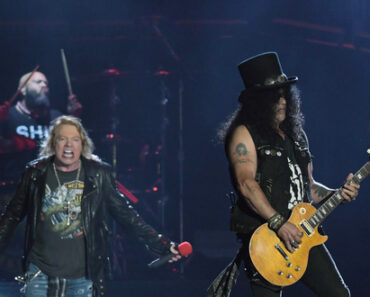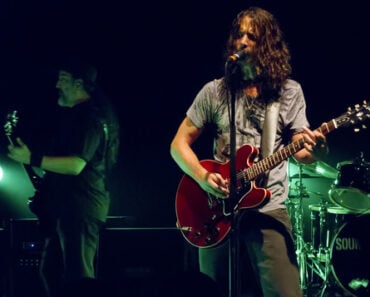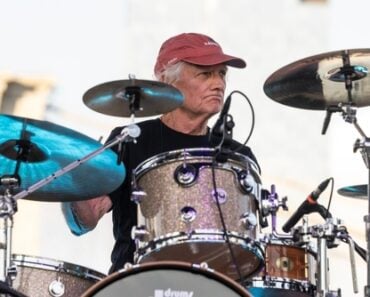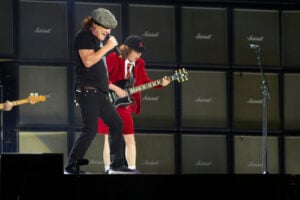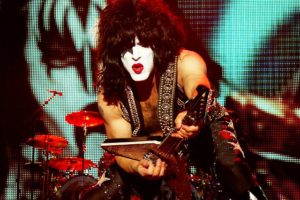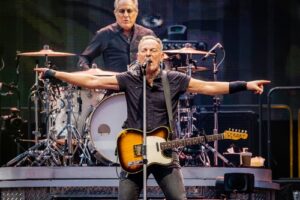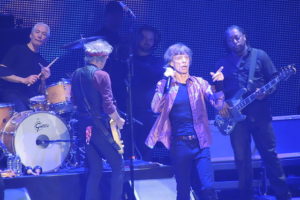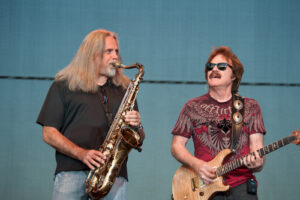
Feature Photo: Randy Miramontez / Shutterstock.com
Complete List Of The Doobie Brothers Band Members looks at the musicians who were and are a part of an American rock band hailing from San Jose, California. Since 1970, The Doobie Brothers have experienced various lineup changes, while traversing musical genres that encompass rock, pop, and even elements of R&B and soul. Founded by original members Tom Johnston, John Hartman, Dave Shogren, and Patrick Simmons, The Doobie Brothers’ distinct musical style and evolving sound has captivated audiences for more than five decades.
In the early days, the band’s first self-titled album “The Doobie Brothers” (1971) failed to make a significant commercial impact, but it laid the groundwork for their signature sound which was a blend of rock, R&B, and folk. Their real breakthrough came with their second album, “Toulouse Street” in 1972, featuring the hit “Listen to the Music,” which catapulted them into stardom. This early success was largely credited to the songwriting prowess and vocal abilities of Tom Johnston and Patrick Simmons.
Around this time, the band also saw its first lineup changes, including the departure of Dave Shogren, who was replaced by Tiran Porter, and the addition of a second drummer, Michael Hossack. This lineup released several more albums that became commercial and critical successes, including “The Captain and Me” (1973) and “What Were Once Vices Are Now Habits” (1974).
In 1975, Johnston fell seriously ill and was temporarily replaced by Jeff “Skunk” Baxter, who had left Steely Dan. This led to the addition of Michael McDonald, whose distinct voice and keyboard skills brought a different texture to the band’s music. Under McDonald’s influence, the band transitioned into a softer sound and ventured into more soulful territories, best exemplified by the album “Takin’ It to the Streets” (1976). This new era of The Doobie Brothers was marked by hits like “What a Fool Believes” and “Minute by Minute,” both of which were milestones in their career.
The band broke up in 1982 after a farewell tour but reunited in 1987, bringing back several original and early members like Johnston and Simmons. Throughout the late 1980s and 1990s, the band continued to tour and release new material, although not achieving the commercial success of their earlier years. They had lineup changes during this period, with notable additions like percussionist Marc Quiñones and guitarist John McFee.
In 2020, The Doobie Brothers were selected for induction into the Rock and Roll Hall of Fame, marking a pinnacle in their long, storied career. Their influence can be seen in the way they seamlessly blended different genres of music into a sound distinctly their own. From the early rock and R&B influences to the soulful tunes of the Michael McDonald era, The Doobie Brothers have left an indelible mark on American music history.
The Doobie Brothers Band Members
Patrick Simmons
Patrick Simmons, born on October 19, 1948, in Aberdeen, Washington, is one of the original founding members of The Doobie Brothers. A guitarist and vocalist, he has been the only continuous member of the band since its formation in 1970. Simmons contributed significantly to the band’s multi-faceted sound, blending rock, pop, and R&B. He played on all of the Doobie Brothers’ studio albums, from their self-titled debut in 1971 to their latest releases. Notable albums featuring Simmons include “Toulouse Street” (1972), “The Captain and Me” (1973), “What Were Once Vices Are Now Habits” (1974), and “Minute by Minute” (1978), among others.
He penned some of the band’s popular songs, including “South City Midnight Lady” and the iconic hit “Black Water,” which became the Doobie Brothers’ first No. 1 single. Patrick Simmons briefly pursued a solo career during the Doobie Brothers’ hiatus in the 1980s, releasing albums such as “Arcade” (1983) and “Take Me to the Highway” (1996). His solo work was moderately successful but did not reach the heights of his career with The Doobie Brothers. When the band reunited in 1987, Simmons was integral to its revival and continues to be an active member.
Tom Johnston
Tom Johnston, born on August 15, 1948, in Visalia, California, is another original founding member of The Doobie Brothers. As a guitarist and vocalist, Johnston was instrumental in establishing the band’s initial rock and roll sound infused with elements of blues, folk, and country. He played on the early albums, including “The Doobie Brothers” (1971), “Toulouse Street” (1972), and “The Captain and Me” (1973). He is responsible for some of the band’s major hits like “Listen to the Music,” “Rockin’ Down the Highway,” and “Long Train Runnin’.”
Johnston had to leave the band in 1975 due to health issues, just before the release of the “Stampede” album. During this period, he released a couple of solo albums, but they did not achieve significant commercial success. He rejoined the band in 1979 but did not participate in the recording of new material until “Cycles” in 1989. Tom Johnston has been active with the band since its reformation in 1987 and continues to tour and record with them. His bluesy guitar and soulful voice remain significant to the Doobie Brothers’ enduring legacy.
John Hartman
John Hartman is one of the co-founders of The Doobie Brothers and was born on March 18, 1950, in Falls Church, Virginia. He was the original drummer for the band when it was formed in 1970. Hartman played on the early albums, including the self-titled debut “The Doobie Brothers” in 1971, “Toulouse Street” in 1972, and “The Captain and Me” in 1973. He left the group in 1979 but returned in 1987 when The Doobie Brothers reunited. Although not credited with major songwriting contributions, his drumming played a significant role in defining the band’s sound during its formative years. Hartman left the band for the second time in 1992 and has since been less active in the music scene.
Dave Shogren
Dave Shogren was the original bassist for The Doobie Brothers and hailed from San Jose, California. He was with the band from its inception in 1970 until 1972. Shogren played on the band’s debut album, “The Doobie Brothers,” released in 1971. Although his tenure with the band was relatively short, he was instrumental in laying down the foundational grooves that helped define the band’s early sound. After leaving the Doobie Brothers, Shogren mostly stayed out of the public eye and didn’t achieve notable success in other musical ventures.
Michael Hossack
Born on October 17, 1946, in Paterson, New Jersey, Michael Hossack was another drummer for The Doobie Brothers. He joined the band in 1971 and participated in the recording of albums like “Toulouse Street” (1972) and “The Captain and Me” (1973). Hossack left the band in 1973 but rejoined in 1987 when the group reunited. He remained a steady contributor to the Doobie Brothers until health issues forced him to take a leave of absence in 2010. Known for his steady and reliable drumming, Hossack was a key component in hits like “Listen to the Music” and “China Grove.” He passed away in 2012.
Tiran Porter
Tiran Porter, born on September 26, 1948, in Los Angeles, California, joined The Doobie Brothers as a bassist in 1972, replacing Dave Shogren. He played on several important albums, including “The Captain and Me” (1973), “What Were Once Vices Are Now Habits” (1974), and “Takin’ It to the Streets” (1976). Porter provided backing vocals and occasionally lead vocals, most notably on the song “For Someone Special” from the “Takin’ It to the Streets” album. He left the band in 1980 but returned for the 1987 reunion and continued to participate in various lineups of the band until 1992. Porter has also performed with other artists and bands but remains most well-known for his work with The Doobie Brothers.
Keith Knudsen
Keith Knudsen was born on February 18, 1948, in Le Mars, Iowa. He joined The Doobie Brothers as a drummer in 1974, replacing Michael Hossack. Knudsen played on several albums including “Stampede” (1975), “Takin’ It to the Streets” (1976), and “Minute by Minute” (1978). He contributed vocals to some of the band’s songs and co-wrote tracks like “Double Dealin’ Four Flusher” and “You’re Made That Way.” He left the band in 1982 but rejoined in 1993, participating in subsequent albums and tours until his death in 2005. Outside of The Doobie Brothers, Knudsen was part of the rock group Southern Pacific and even released a solo album.
Jeff “Skunk” Baxter
Jeff “Skunk” Baxter was born on December 13, 1948, in Washington, D.C. He joined The Doobie Brothers in 1974 after previously playing with the band Steely Dan. Known primarily as a guitarist, Baxter contributed significantly to albums like “Stampede” (1975) and “Takin’ It to the Streets” (1976). His jazz-infused style added a new dimension to the band’s sound. Baxter didn’t stay with The Doobie Brothers for long, leaving in 1979, but his influence during his tenure was significant. Beyond his time with The Doobie Brothers, Baxter has had a highly successful career as a session musician and even as a defense consultant, specializing in counter-terrorism.
Michael McDonald
Born on February 12, 1952, in St. Louis, Missouri, Michael McDonald joined The Doobie Brothers in 1975 as a keyboardist and vocalist. His soulful voice and songwriting skills brought a new direction to the band’s music, steering them more towards a soft rock and blue-eyed soul sound. Michael McDonald played a significant role in albums like “Takin’ It to the Streets” (1976), “Livin’ on the Fault Line” (1977), and “Minute by Minute” (1978), which won a Grammy for Album of the Year. He is credited with some of the band’s biggest hits, including “What a Fool Believes” and “Takin’ It to the Streets.” Michael McDonald left the band when they disbanded in 1982 but has rejoined for various reunion tours. He has also had a successful solo career, releasing several albums and collaborating with numerous artists across different genres.
John McFee
Born on September 9, 1950, in Santa Cruz, California, John McFee joined The Doobie Brothers in 1979 as a guitarist, vocalist, and violinist. He replaced Jeff “Skunk” Baxter and contributed to the album “One Step Closer” (1980). McFee was part of the band’s lineup when they disbanded in 1982 and returned for the reunion in 1987, contributing to albums like “Cycles” (1989) and “Sibling Rivalry” (2000). Known for his versatility, he played various instruments and was involved in writing songs like “South Bay Strut.” Outside of The Doobie Brothers, McFee has been a sought-after session musician and was a founding member of the country-rock band Southern Pacific.
Chet McCracken
Chet McCracken, born on October 17, 1952, in Seattle, Washington, joined The Doobie Brothers as a drummer and percussionist in 1979, replacing Keith Knudsen. McCracken was part of the band’s lineup when they disbanded in 1982 and did not rejoin during the 1987 reunion. He played on the album “One Step Closer” (1980). Outside of The Doobie Brothers, McCracken has had a successful career as a session musician, playing for a variety of artists in different genres.
Cornelius Bumpus
Born on May 7, 1945, in Coffeyville, Kansas, Cornelius Bumpus joined The Doobie Brothers in 1978 as a saxophonist and keyboardist. He participated in the recording of the album “Minute by Minute” (1978). Bumpus was not part of the lineup when the band disbanded in 1982. He was also known for his work with Steely Dan and his solo jazz albums.
Bobby LaKind
Bobby LaKind was born on July 3, 1945, in San Francisco, California. Initially a lighting roadie for the band, he became a percussionist and vocalist in 1977. LaKind participated in the albums “Minute by Minute” (1978) and “One Step Closer” (1980), among others. He had to leave the band due to health issues in the 1990s and passed away in 1992. LaKind didn’t have a significant musical career outside The Doobie Brothers but is remembered fondly for his contributions to the band.
Willie Weeks
Born on August 5, 1947, in Salemburg, North Carolina, Willie Weeks is a bassist who briefly played with The Doobie Brothers in the early 1980s, particularly during their farewell tour. He is not credited with any studio recordings with the band. Weeks is renowned as a session musician, having played for numerous high-profile artists like Aretha Franklin, George Harrison, and Eric Clapton, among others.
Musicians Who Have Contributed The Doobie Brothers Band Albums And Tours
John Cowan
Born on August 24, 1952, in Evansville, Indiana, John Cowan joined The Doobie Brothers in 1993 as a bassist and vocalist. He participated in the album “Sibling Rivalry” (2000) and was part of the band’s various tours. Cowan is known for his strong, distinctive vocals and his ability to play in various styles. Outside of The Doobie Brothers, Cowan is renowned for his work in the progressive bluegrass band New Grass Revival and his solo career, where he blends elements of rock, country, and bluegrass.
Marc Russo
Marc Russo, born on August 15, 1958, in New York, New York, joined The Doobie Brothers in 1998 as a saxophonist. Russo has played on various tours and live performances but is not credited on any of the band’s studio albums. Known for his mastery in both jazz and rock, Russo was previously a member of the jazz group Yellowjackets and has been a session musician for numerous artists across different genres.
Marc Quiñones
Born on September 25, 1969, in The Bronx, New York, Marc Quiñones joined The Doobie Brothers in 2020 as a percussionist. He has yet to be credited on any of the band’s studio albums but has participated in various live performances and tours. Quiñones is widely known for his extensive work with the Allman Brothers Band and his expertise in Latin percussion. He has also had a successful career as a session musician, playing with a variety of artists across different musical styles.
Wayne Jackson
Wayne Jackson, born on November 24, 1941, in West Memphis, Arkansas, and passing away in 2016, was a trumpeter who performed with The Doobie Brothers briefly from 1976 to 1977. He was a part of the Memphis Horns and contributed to the album “Takin’ It to the Streets” as well as its subsequent tour. Outside of The Doobie Brothers, Jackson was a legendary session musician who performed with renowned artists like Otis Redding, Elvis Presley, and Neil Diamond.
Andrew Love
Andrew Love, born on November 21, 1941, in Memphis, Tennessee, and passing away in 2012, played tenor saxophone with The Doobie Brothers during 1976-1977. Like Wayne Jackson, he was also a part of the Memphis Horns and participated in the album “Takin’ It to the Streets” and its tour. Love had an illustrious career, collaborating with a myriad of artists including Aretha Franklin and U2.
Lewis Collins
Lewis Collins joined The Doobie Brothers as a saxophonist for a brief stint from 1976 to 1977. He performed during the “Takin’ It to the Streets” era and its corresponding tour. Information about his life outside of The Doobie Brothers is limited.
James Mitchell
James Mitchell performed baritone saxophone with The Doobie Brothers during 1976-1977. Like his peers, he was involved in the “Takin’ It to the Streets” album and tour. Mitchell has had a wide-ranging career in the music industry, although specifics related to The Doobie Brothers are limited.
Jack Hale
Jack Hale was a trombonist who played with The Doobie Brothers in 1976-1977. He contributed to the “Takin’ It to the Streets” album and its tour. Hale has had an extensive career as a session musician, but detailed information about his work outside of The Doobie Brothers is sparse.
Norton Buffalo
Norton Buffalo, born on September 28, 1951, in Oakland, California, was a harmonica player and singer who occasionally performed with The Doobie Brothers, although the exact years of his association are not well-documented. Norton Buffalo had a prolific career outside of The Doobie Brothers, most notably as a member of the Steve Miller Band. He passed away in 2009.
Ed Toth
Ed Toth, born on July 4, 1969, in Worcester, Massachusetts, joined The Doobie Brothers in 2005 as a drummer, replacing Keith Knudsen who passed away that year. He has been involved in live performances and tours, although he hasn’t been credited on any new studio albums by the band since he joined. Before joining The Doobie Brothers, Toth was a member of the rock band Vertical Horizon and played on their hit album “Everything You Want.”
Rosemary Butler
Rosemary Butler joined The Doobie Brothers as a backing vocalist from 1977 to 1978. Her vocal contributions were a part of the band’s evolving sound during this period. Outside of The Doobie Brothers, she has worked with a variety of artists including Jackson Browne and James Taylor. She was born on April 6, 1947, in Los Angeles, California.
Maureen McDonald
Maureen McDonald, also known as Michael McDonald’s sister, performed as a backing vocalist for The Doobie Brothers. Her tenure with the band is not clearly documented, but she contributed to the overall vocal texture during her time with the band. She has also worked with other artists throughout her career.
Dale Ockerman
Dale Ockerman played multiple instruments for The Doobie Brothers, including keyboards and guitar. While his exact years with the band are not readily documented, his role was versatile, contributing to several albums and live performances. Dale has also played with other acts such as Quicksilver Messenger Service.
Richard Bryant
Richard Bryant was with The Doobie Brothers from 1989 to 1991. He contributed vocals and possibly other instrumental performances, although specifics are limited. The period of his involvement was during one of the band’s less publicized eras.
Jimi Fox
Jimi Fox’s association with The Doobie Brothers is not well-documented, and details regarding the role he played within the band are limited.
Danny Hull
Danny Hull was a saxophonist for The Doobie Brothers from 1993 to 1998. He was a part of the band during the ’90s, a time when they were actively touring but not necessarily releasing new material. Danny Hull had previously played with a range of artists and groups before joining The Doobie Brothers.
Skylark
Also known as Gary Skylark, he played bass guitar for The Doobie Brothers from 1995 to 2010. His long tenure with the band saw him contributing to both live performances and studio recordings. Skylark has also been involved in various other musical projects over the years.
Bernie Chiaravalle
Bernie Chiaravalle has had a long association with Michael McDonald and, by extension, has contributed to The Doobie Brothers, although the exact role and timeframe are not clearly documented. He is a multi-instrumentalist, and outside of his work with The Doobie Brothers, he has had a solo career, releasing several albums.
Guy Allison
Guy Allison was a keyboardist for The Doobie Brothers from 1996 to 2015. In his nearly two decades with the band, he participated in numerous live performances and recordings, contributing to the band’s sonic palette. Prior to joining The Doobie Brothers, Allison had been part of other notable acts like the Moody Blues.
Marvin “M.B.” Gordy
Marvin “M.B.” Gordy was a percussionist for The Doobie Brothers from 2001 to 2005. His role was to enrich the rhythm section, enhancing the band’s overall sound. Outside of The Doobie Brothers, Gordy is an accomplished session musician and has worked in various genres of music.
Ed Wynne
Ed Wynne served as a substitute musician for The Doobie Brothers in 2002. His specific contributions are not well-documented, but he filled in as needed during his time with the band. Wynne’s broader career details are also limited.
Tony Pia
Tony Pia was the drummer for The Doobie Brothers from 2010 to 2016. He participated in several tours and may have contributed to studio recordings during his time with the band. Pia has also been a member of Brian Wilson’s touring band and has a range of other musical collaborations to his name.
Bill Payne
Bill Payne, best known as the co-founder of Little Feat, has collaborated with The Doobie Brothers, although the specifics of his role are not clearly documented. He is an accomplished keyboardist and songwriter, with credits that span multiple decades and include working with a wide array of artists and bands.
Complete List Of The Doobie Brothers Band Members article published on Classic RockHistory.com© 2023
Classicrockhistory.com claims ownership of all its original content and Intellectual property under United States Copyright laws and those of all other foreign countries. No one person, business, or organization is allowed to re-publish any of our original content anywhere on the web or in print without our permission. All photos used are either public domain Creative Commons photos or licensed officially from Shutterstock under license with ClassicRockHistory.com. All photo credits have been placed at the end of the article. Album Cover Photos are affiliate links and the property of Amazon and are stored on the Amazon server. Any theft of our content will be met with swift legal action against the infringing websites.


